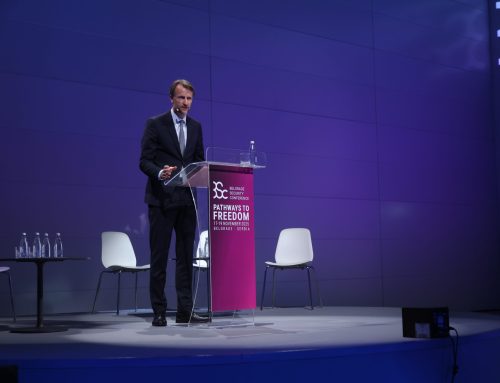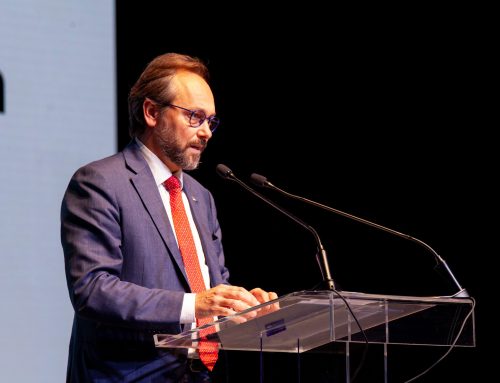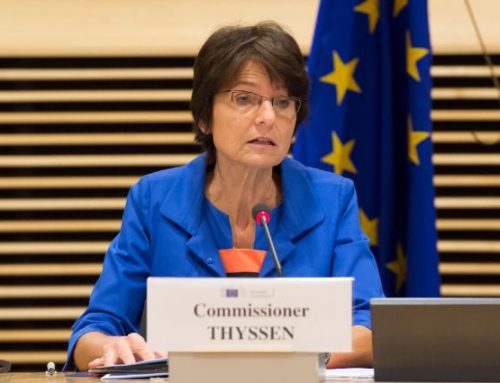EU-Serbia: Working Together
By Mr Christian Danielsson, Director General
DG Neighbourhood Policy and Enlargement Negotiations
The European Commission
19 March 2015
University of Novi Sad
Ladies and gentlemen,
- It is my great pleasure to be here in Novi Sad with you today. Prime Minister Pajtić, State Secretary Belić, Rector Pejanović, Dr Hrvojević and I have just opened the new building of the Faculty of Sciences, Department of Mathematics and Physics.
- On my way here, I stopped at the Petrovaradin fortress. You are fortunate to live in such a beautiful European city nested between plains, mountains and sparkling Danube. That breath-taking view from Petrovaradin gave me a strong feel of your people’s well-rooted ingenuity and resourcefulness, and I felt confidence in the future of Novi Sad and Serbia as part of the EU family of cities and nations.
Serbia on its EU path – State of play of negotiations
- Allow me to say in very clear terms: I have no doubt about this future. Serbia has declared that accession to the EU is its key strategic goal. And the whole European Union – the European Commission, the European Parliament, and the 28 Member States – is firmly committed to Serbia’s European perspective.
- We are working with you hard to reach this goal. Accession negotiations were launched in January last year. The screening process will be finalised next week. I must say that we are all impressed in Brussels by the commitment and professionalism shown by Serbia’s negotiation team throughout.
Fundamentals first approach
- In these accession negotiations we follow a fundamentals first approach. We focus on:
- rule of law
- economic governance, and
- public administration
- Rule of law is extremely important for many reasons:
- it will ensure the enforcement of the acquis once Serbia is Member State
- it will ensure enforcement of commercial contracts, creating a level playing field and a climate of confidence in the economy
- finally, it will guarantee human and minority rights, media freedom and freedom of expression, thus strengthening democracy
- Economic governance has developed in the EU further to the turbulence the Union’s economy and currency went through in the last few years. It is meant to coordinate economic and fiscal policies of our Member States and create conditions conducive to attracting business investment, bringing growth and generating jobs.
- We focus on public administration as a protector of citizens’ rights and as the basis of the proper functioning of the state, providing the necessary services to business and citizens. The role of independent regulatory bodies is essential.
- We intend to work hard with Serbia on all three fundamentals. Progress will ensure the establishment of the basis on which successful negotiations on chapters can be conducted and Serbia can be in a position to take on all obligations of, and exercise all rights from EU membership.
- Serbia needs also to make progress, at an early stage and throughout the whole accession process, on normalisation of its relations with Kosovo. This pace of normalisation will be taken into account for setting the pace of accession negotiations themselves.
- Joining the EU is a societal project, which ultimately belongs to the citizens. It will be important that stakeholders, civil society, students, the academic community feel they own the process and feel associated with the reforms that it brings.
Progress on rule of law not to be put at risk
- Chapters 23 and 24, dealing with judiciary, fundamental rights, fight against corruption and organised crime, require particularly deep reforms. Serbia has started to reform its judiciary and there is a strong political impetus to fight against corruption, but we are not there yet. More work needs to be done.
- Those crucial issues are currently addressed by the Serbian authorities in the framework of the action plans on Chapters 23 and 24.
- Those action plans are key documents for two reasons. 1) They will pave the way for sound and in-depth reforms geared towards concrete results. Serbian citizens again should be confident in their judiciary, its efficiency, its independence. 2) But those action plans are also an important political tool as they will provide for Serbia’s vision on how to move towards a more modern society on fundamental values. Let me take as examples media freedom and independent regulatory bodies, dealt with under Chapter 23. Commissioner Hahn has consistently underlined the critical importance of media freedom as a non-negotiable fundamental right, and as key condition for progress on candidate countries’, and Serbia’s in particular, EU path. The same applies to respecting the role and independence of supervisory bodies such as the Ombudsman. It is crucial for the pace of negotiations that Serbia is not perceived by EU Member States as stepping back on those fundamental EU values, and monitoring the implementation of those action plans on Chapters 23 and 24 will allow Member States to do so throughout the negotiation process.
- I hope that credible, comprehensive and sustainable action plans along those lines could contribute to the possible opening of Chapters 23 and 24 before the end of the year.
Continued commitment to economic and structural reforms essential
- As I mentioned at the outset, reviving the economy and generating new jobs are also among our top priorities. We have engaged in an economic policy dialogue with Serbia on comprehensive reform of the public administration; restructuring and privatising state-owned companies; facilitation of procedures regulating the labour market and construction permits; restructuring of non-performing loans in the banking sector. Serbia shows commitment and has started delivering on those issues, by adopting the new laws on labour, privatisation and bankruptcy, and a law on construction permits. And the February arrangement with the IMF further engages Serbia in a comprehensive programme of structural reforms.
- Why are we supporting these economic and structural reforms in Serbia? Because our common goals – those of Serbia and of the EU – are clear: to revive growth and to create jobs; to improve our competitiveness and to prepare for the global challenges ahead, be they with regard to the digital age, the race for innovation and skills, the scarcity of natural resources, the safety of our food, the cost of energy, the impact of climate change, or the ageing of our population.
- We know what will be the benefits of EU membership for Serbian citizens. It will bring them freedom to travel, live, work, retire or study anywhere within the EU. EU membership will also allow your companies to operate more easily across the world’s largest market. EU membership means that consumers will be better protected, that infrastructure such as road and rail networks will improve, that quality of air and water will increase. Increased competition will result in a greater variety of goods offered in the Serbian market which can be expected to lower prices. Indeed, all the countries that have joined the EU have seen an increase in their living standards, life expectancy and in a large range of social and health indicators. Inside the EU, Serbia will maintain its cultural specificities as part of the European family. More tourists will come to Petrovaradin and to Novi Sad to admire your historical and cultural heritage and to enjoy the vibrant city atmosphere. The EXIT music festival will attract even more young people from all Europe. There will be more possibilities for students and professors from Serbia to participate in exchange programmes like Erasmus+. Almost 200 students from Serbia have benefitted from Erasmus programme in 2014. When it comes to postgraduate students, they were almost 1500 over the last 10 years. I hope this number will grow in the future.
- I strongly feel that this is something worth doing, something that we can do together!
Commission committed to continue to assist Serbia
- Our commitment to Serbia’s EU path is reflected in considerable EU assistance to Serbia, about €200 million each year in grants, which will amount to €1.5 billion from 2014-2020.
- It is also reflected in the fact that the EU immediately reacted and showed solidarity with Serbia after the May 2014 floods. The EU is the main donor to help your citizens recover after the damage that the floods left, with about €170 million in grants (Note: €173.6 is the sum of: €30 m from IPA 2012, €62 m from IPA 2014 plus €10 m from its regional dimension, €60.2 m from Solidarity Fund, €6 m ECHO EU CPM, €2 m for the regional funds (CBC), €1.4 m from CPM and ECHO after floods in May-July 2014.). Effective preventive measures, to reduce the risks of such floods in the future, are now our main priority.
- The EU is by far Serbia’s top partner in terms of trade, investment, assistance, and favourable loans. Take grants, for example. The EU has provided over €2.9 billion of grants to Serbia since 2000, and this not counting bilateral assistance from EU Member States. Serbia is one of the biggest recipients of EU funds in the world and the largest from the whole region of the Western Balkans with €200 million per year. The EU invested in Serbia’s transport infrastructure, health care, air and water quality, solid waste, improvements in your public service.
- The EU has also provided nearly €5.8 billion in favourable loans.
- Closer to you, and in addition to this beautiful new building of the Faculty we have just opened, the EU and the European Investment Bank have contributed to two other projects on this campus – the Rectorate building and the Science and Technology Park building. We have also contributed to improving infrastructure for research and development.
- Overall, the EU has assisted the Ministry of Education, Science and Technological Development and 27 Faculties at five State Universities in Serbia with a grant of €30 million. This includes the renewal of laboratories, research cabinets, study rooms and communal facilities in Belgrade, Novi Sad, Kragujevac, Niš, Kraljevo, Novi Pazar, Bor, Vrnjačka Banja, Čačak, and Leskovac.
- You see: we are working together to develop Serbia’s human potential, the manifold talents and ingenuity of Serbian people. And I do not doubt that Serbia and Europe will benefit from your talents!
- The enlargement process remains crucial for maintaining the momentum of reforms. The strategic choice of the future of Serbia is clear to see for all.
- For Serbia it means greater wellbeing and stability in the region.
- For the EU, accession negotiations have the same priority as before: they will continue with the same spirit and commitment. The EU will be actively helping Serbia to prepare for accession.
- Thank you for your attention.



